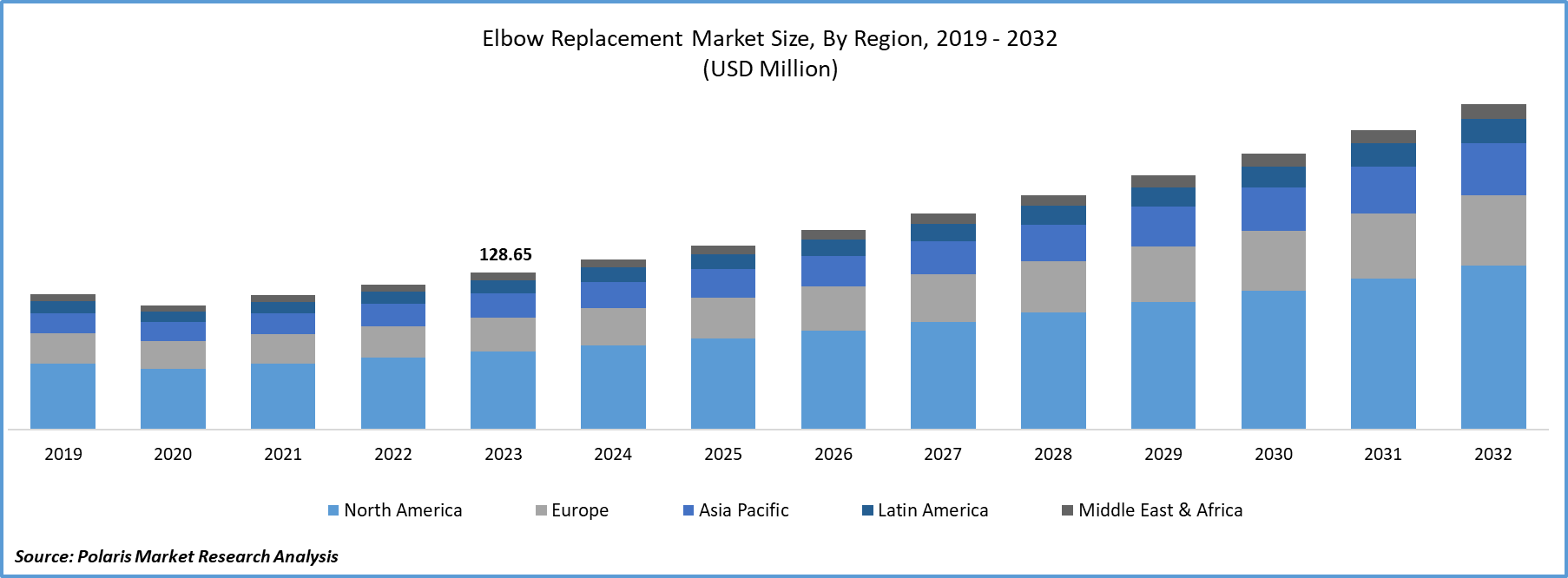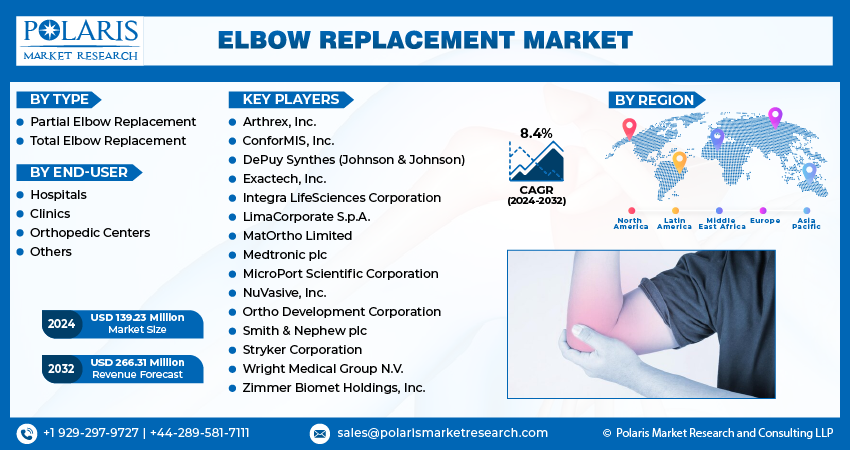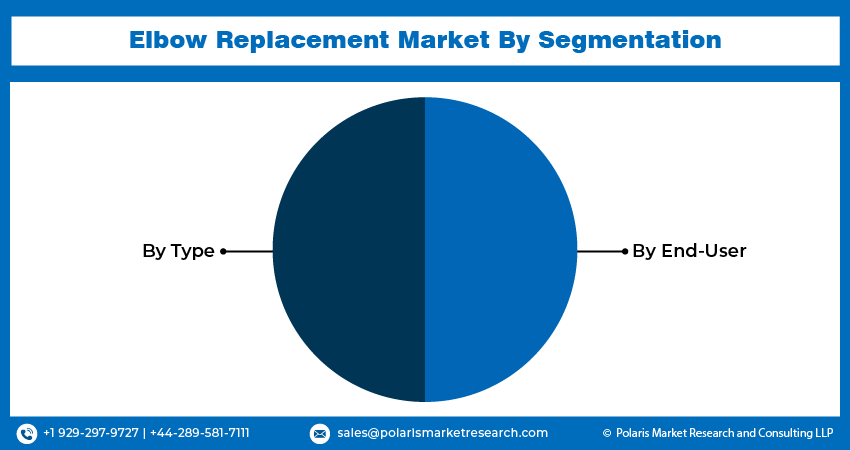
Elbow Replacement Market Share, Size, Trends, Industry Analysis Report, By Type (Partial Elbow Replacement, Total Elbow Replacement); By End-User; By Region; Segment Forecast, 2024- 2032
- Published Date:Feb-2024
- Pages: 118
- Format: PDF
- Report ID: PM4415
- Base Year: 2023
- Historical Data: 2019 – 2022
Report Outlook
Elbow Replacement Market size was valued at USD 128.65 million in 2023.
The market is anticipated to grow from USD 139.23 million in 2024 to USD 266.31 million by 2032, exhibiting the CAGR of 8.4% during the forecast period.
Market Introduction
Technological advancements have played a pivotal role in the elbow replacement market's evolution, with the development of innovative implant materials and surgical techniques, enhancing the durability and effectiveness of elbow replacements. Additionally, the growing awareness of minimally invasive procedures has spurred the adoption of arthroscopy-assisted elbow replacement surgeries.
The global increase in the aging population plays a crucial role as age-related degeneration and osteoarthritis drive the escalating demand for elbow replacements. Simultaneously, a heightened occurrence of sports-related injuries amplifies market growth, particularly among younger demographics. Emerging markets offer substantial opportunities due to advancing healthcare infrastructure and growing awareness of orthopedic solutions. This favorable environment encourages market expansion.
For instance, in March 2023, The Shanghai Sixth People's Hospital reported the successful implementation of a groundbreaking, custom-designed prosthetic replacement for a patient experiencing intricate dysfunction in the elbow joint.

To Understand More About this Research: Request a Free Sample Report
Nevertheless, persistent challenges in the affordability and accessibility of elbow replacement procedures underscore the need for initiatives to enhance their widespread availability. As ongoing advancements and targeted efforts address these challenges, the elbow replacement market share is poised for sustained growth. This trajectory promises improved solutions for patients and a broader spectrum of opportunities for industry participants.
Industry Growth Drivers
Rising Musculoskeletal Disorders Among the Ageing Population is Projected to Spur the Product Demand
The surge in musculoskeletal disorders significantly propels the elbow replacement market growth. Rising instances of conditions such as osteoarthritis and degenerative joint disorders fuel the demand for effective interventions, notably elbow replacements. These disorders, impacting the elbow joint and causing pain and functional restrictions, drive individuals to opt for surgical solutions, seeking enhanced mobility and an improved quality of life. The increasing correlation between musculoskeletal disorders and the demand for elbow replacements underscores the market's crucial role in meeting the healthcare requirements of those grappling with elbow-related degeneration and dysfunction.
Increased Advantages of Health Insurance Policy is Expected to Drive Market Growth
The significance of health insurance becomes evident in mitigating the considerable expenses linked to elbow replacements, covering surgical procedures, hospital stays, and rehabilitation costs. With insurance providers acknowledging the essential nature of these interventions, patients witness a decrease in out-of-pocket expenses. This fosters wider accessibility to elbow replacement procedures, allowing individuals to undergo necessary treatments without enduring excessive financial strains. The presence of insurance advantages contributes to heightened affordability, transforming elbow replacements into a more attainable and practical choice for a diverse range of patients seeking relief from elbow-related ailments.

Industry Challenges
Limited Awareness and Complex Surgical Interventions is Likely to Impede the Market Elbow Replacement Growth Opportunities
The complexity of the surgical interventions and the potential for postoperative complications can deter patient acceptance. More awareness about the benefits of elbow replacements among both healthcare providers and the general population poses a communication challenge. Regulatory hurdles, including approval processes for new prosthetic designs, also impede market expansion. Addressing these hindrances is crucial to enhancing the widespread adoption and accessibility of elbow replacement solutions for individuals grappling with elbow-related issues.
Report Segmentation
The market is primarily segmented based on type, end-user, and region.
|
By Type |
By End-User |
By Region |
|
|
|
To Understand the Scope of this Report: Speak to Analyst
By Type Analysis
Partial Elbow Replacement Segment is Expected to Witness Highest Growth During Forecast Period
The partial elbow replacement segment is projected to grow at a CAGR during the projected period in the elbow replacement market industry. This surge is attributed to its less invasive nature, offering a joint-preserving alternative for conditions like osteoarthritis and rheumatoid arthritis. With a focus on addressing specific areas of joint damage, partial elbow replacements result in quicker recovery and improved functionality compared to total replacements. Technological advancements in implant design and surgical techniques contribute to the increasing acceptance of partial elbow replacements, providing patients with effective options for restoring elbow function while minimizing the impact on the natural joint.
By End-User Analysis
Hospitals Segment is Expected to Dominate the Market During Forecast Period
The expansion of hospitals in the market is pivotal, driven by increasing demand for elbow replacements due to aging populations and rising musculoskeletal disorders. Hospitals are enhancing their orthopedic departments through collaborations with surgeons and adopting advanced techniques and implant technologies. Investments in state-of-the-art facilities, staff training, and cutting-edge equipment ensure comprehensive and efficient elbow replacement services. This growth not only addresses growing healthcare needs but also establishes hospitals as key contributors to orthopedic care advancement, fostering innovation and ensuring widespread accessibility to effective elbow replacement solutions.
However, orthopedics clinics are expected to be the most lucrative segment contributing to the elbow replacement market revenue. These clinics play a pivotal role in providing comprehensive services, including evaluation, surgery, and postoperative care for elbow replacements. The growing collaboration between orthopedic surgeons and clinics, along with advancements in surgical techniques and implant technologies, boosts the preference for these facilities. As the demand for effective elbow replacement solutions increases, orthopedic clinics emerge as essential providers, ensuring accessibility, expertise, and quality care for individuals seeking relief from elbow-related ailments.

Regional Insights
North America Region Dominated the Global Market in 2023
North America dominated the global market in 2023 and is expected to continue to do so. The growth is attributed to factors such as an aging population, increasing instances of musculoskeletal disorders, and heightened awareness of advanced orthopedic solutions. The well-established healthcare infrastructure in the United States, coupled with a significant patient base, contributes to robust market expansion. Canada follows a similar trajectory, emphasizing the rising importance of orthopedic care. Technological advancements and a preference for less invasive procedures, including partial elbow replacements, further drive the demand, positioning North America as a key region fostering the growth of the market.
In the meanwhile, the Asia-Pacific region is expected to be the most lucrative region in the market. Factors like a rising incidence of musculoskeletal disorders and an increasing awareness of advanced orthopedic solutions drive growth. In China and India, accelerated economic development and enhancements in healthcare infrastructure are boosting the demand for elbow replacements. Japan, characterized by its aging population, significantly contributes to market expansion. Technological advancements and an escalating preference for innovative orthopedic interventions, specifically elbow replacements, establish these Asian nations as pivotal players in the thriving market in the region.

Key Market Players & Competitive Insights
The elbow replacement market share is fragmented and is anticipated to witness competition due to several players' presence. Major service providers in the market are constantly upgrading their technologies to stay ahead of the competition and to ensure efficiency, integrity, and safety. These players focus on partnership, product upgrades, and collaboration to gain a competitive edge over their peers and capture a significant market share.
Some of the major players operating in the global market include:
- Arthrex, Inc.
- ConforMIS, Inc.
- DePuy Synthes (Johnson & Johnson)
- Exactech, Inc.
- Integra LifeSciences Corporation
- LimaCorporate S.p.A.
- MatOrtho Limited
- Medtronic plc
- MicroPort Scientific Corporation
- NuVasive, Inc.
- Ortho Development Corporation
- Smith & Nephew plc
- Stryker Corporation
- Wright Medical Group N.V.
- Zimmer Biomet Holdings, Inc.
Recent Developments
- In May 2023, Johnson & Johnson's MedTech subsidiary, DePuy Synthes, has gained approval from the Food and Drug Administration for the utilization of its INHANCE Shoulder System in reverse shoulder replacement procedures. This system, characterized by its streamlined design with just two instrument trays, provides surgeons in the operating room (OR) with significant flexibility to carry out various functions tailored to the procedure's requirements.
- In May 2022, Ossio, Inc. introduced OSSIOfiber Suture Anchors. These anchors are specifically utilized in hand and wrist surgeries, showcasing the company's commitment to diversifying its offerings in the medical field.
Report Coverage
The elbow replacement market report emphasizes on key regions across the globe to provide better understanding of the product to the users. Also, the report provides market insights into recent developments, trends and analyzes the technologies that are gaining traction around the globe. Furthermore, the report covers in-depth qualitative analysis pertaining to various paradigm shifts associated with the transformation of these solutions.
The report provides detailed analysis of the market while focusing on various key aspects such as competitive analysis, type, end-user, and their futuristic growth opportunities.
Elbow Replacement Market Report Scope
|
Report Attributes |
Details |
|
Market size value in 2024 |
USD 139.23 million |
|
Revenue forecast in 2032 |
USD 266.31 million |
|
CAGR |
8.4% from 2024 – 2032 |
|
Base year |
2023 |
|
Historical data |
2019 – 2022 |
|
Forecast period |
2024 – 2032 |
|
Quantitative units |
Revenue in USD million and CAGR from 2024 to 2032 |
|
Segments covered |
|
|
Regional scope |
|
|
Competitive Landscape |
|
|
Report Format |
|
|
Customization |
Report customization as per your requirements with respect to countries, region, and segmentation. |
FAQ's
key companies in Elbow Replacement Market are DePuy Synthes (Johnson & Johnson), Exactech, Inc., Integra LifeSciences Corporation
Elbow Replacement Market exhibiting the CAGR of 8.4% during the forecast period.
The Elbow Replacement Market report covering key segments are type, end-user, and region.
key driving factors in Elbow Replacement Market are rising musculoskeletal disorders among the ageing population is projected to spur the product demand
Elbow Replacement Market Size Worth $266.31 Million By 2032
